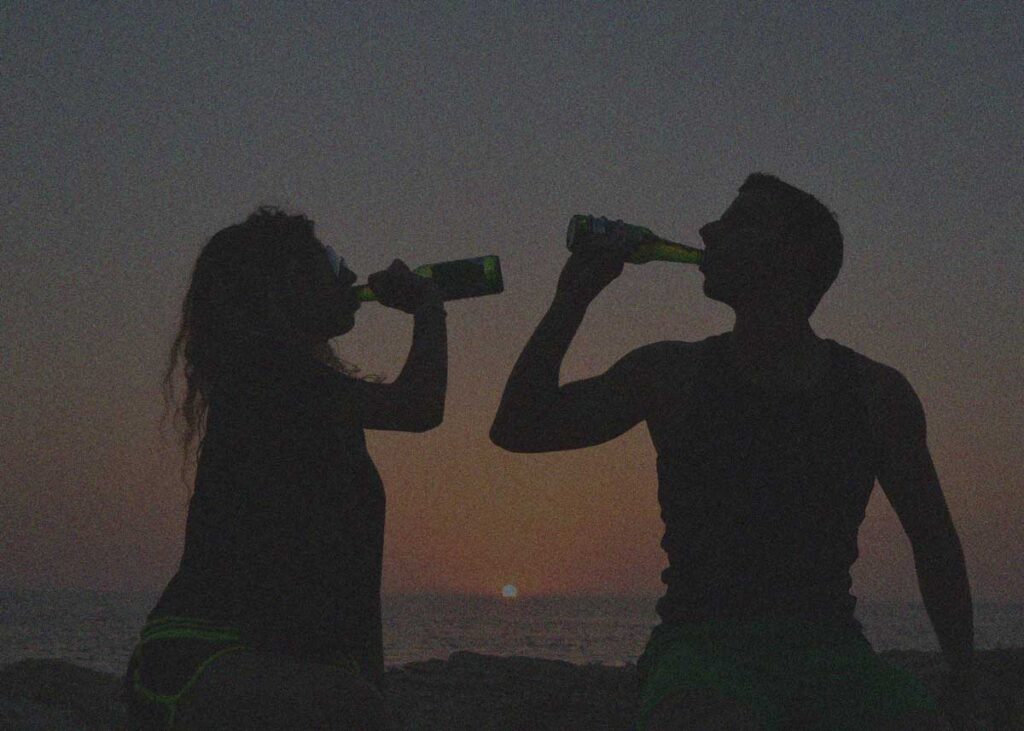
This question is asked by almost every woman wanting to visit or work remotely from Costa Rica, and it is not easy to answer. I have been coming to Costa Rica for 9 years and I reconsider my answer to this question every time I hear a tragic story of violence against a woman in Costa Rica. But while these stories weigh heavily on my mind, I try to keep things in perspective.
Unfortunately, we live in a world where women have to be more careful than men, no matter where in the world you are. Knowing what situations to avoid and things to watch out for when you are traveling to a new country is invaluable information that could save your life. As well as remembering not to let your guard down just because you’re in a place that feels like paradise.
It can be hard to find real information on what specific areas and activities are safe and which should be avoided, or how likely it is that you could experience a violent encounter in Costa Rica. This information is often hidden or skewed for tourism marketing purposes. Costa Rica wants to be known as a safe, family-friendly, eco-tourism destination, not a place where tourists are robbed or assaulted (and it generally is). But hiding this information is only hurting tourists in the end, because they come here unprepared and uninformed, letting their guards down and putting themselves in potentially dangerous situations.
So, I will do my best to give accurate, practical advice on safety for females here, based on my personal experiences in Costa Rica, news stories, discussions on local social media groups, and personal accounts from friends and fellow travelers.
PLEASE NOTE: The scenarios I will warn you about are not meant to be a deterrent from visiting Costa Rica, which is still considered the safest country in Central America, but to warn you about what situations to be cautious in or avoid, so that you can enjoy your visit to this beautiful country.
The truth is that Costa Rica is full of kind, helpful people, beautiful natural wonders, incredible animals, and tasty food. Come here focused on enjoying those things but with the following cautions in the back of your mind.

General Attitude Towards Women
Like many Latin American countries, Costa Rica still has a very sexist, or machista, culture. The idea of gender equality still hasn’t permeated the general population, but things are changing in younger, more educated people, at least. It’s still quite normal for men to catcall as they pass by women. Often instead of whistling it’s a strange pssst noise, which is great at making you feel less than human.
Then, when you’re with a male companion, everything changes. I’ve noticed that when I was with my boyfriend, most male clerks or office representatives would not even look me in the eye or speak directly to me, even when I was the one who understood Spanish, or was paying for things. I found this equally or more insulting than the catcalling, even if it was meant to be “respectful” from their point of view. Because both reinforce the cultural perspective that women are just sexual objects that are up for grabs until a man takes ownership of them.
It’s fairly common for a guy to ask you if you’re married in the first few minutes of meeting you, even in a professional or non-social setting. There is of course, the classic double standard that makes it totally normal for a guy to have multiple girlfriends, or a wife and girlfriends. So with this being the general attitude toward women, it’s not surprising that there are issues with violence against women in Costa Rica.

Nightlife Safety at the Beach: Stay alert and sober
If you go out at night to bars and clubs or beach parties in a tourist town, you need to remember that there are ALWAYS people there who are looking to take advantage of you in some way or another. Tourist towns attract all kinds of opportunists, from your typical sketchy drug dealers and scam artists to more dangerous thieves, rapists or other criminals. Not only do they prey on tourists because they assume they have money, but also because tourists are often gullible, confused, in “vacation-mode” or drunk. So keep alert and trust your instincts when you meet people- or better yet, just don’t trust anyone too quickly. Especially in these environments. If your judgement is impaired by too much alcohol, it’s much easier for someone to charm you and take advantage of you once they have your trust.
Don’t leave your drink unattended or accept a drink from someone you just met. There are many stories of women being drugged with roofies or other substances hidden in drinks, and being sexually assaulted afterwards. A local paper did a story about 5 women who reported sexual assault after being drugged at parties in Nosara in this article, between 2019 and 2021. The use of “roofies” has also been reported in other places, including the capital of San José. (2017. Source.)
Don’t leave the bar to walk on the beach alone or with a stranger. Nothing good happens on the beach after dark, and this is the perfect environment for sexual assailants to lure a victim because no one can hear or see you there. There have been multiple cases of rape and abuse on beaches all over the country. An experienced solo traveler from Mexico was assaulted and murdered on the beach in Santa Teresa just a few years ago (August 2018. Source.). She was even walking with another woman, who was lucky enough to escape with her life.

Don’t take rides from people you don’t know, or from unauthorized taxis. This makes where you go out at night very limiting in most places, but unless you have a trustworthy ride planned, it’s best to do your exploring during the day with your own car or a tour company, and start to head back toward the area you are staying in after sunset. If you want to grab a drink or dinner, stay within walking distance from your hotel/hostel to make sure you can get back on your own. Thankfully, Uber is now widely used in the metropolitan area and some of the bigger beach towns also, which will provide a lot more safe ride options. Just this month a gang rape in Puerto Viejo occurred after a Danish traveler was kidnapped during a Tuk-tuk ride to her hostel at night, and brought to a group of men. She was abused on the beach for hours, until she played dead to finally escape. (January 2022. Source.).
All of these precautions should also be taken in towns and the capital city of San José, of course. It just seems more common for visitors to feel safe at the beaches and forget to follow the same safety rules they would if they were in a city.

Accommodation & Activity Safety: Choose reputable businesses
When you arrive in Costa Rica, you may be shocked at first by the coiled barbed wire or electric fencing on top of walls, angry guard dogs, and bars over windows. But this should tell you that these measures are taken for a reason. Home robberies happen in pretty much every part of the country. So when you are deciding on an AirBnb, hotel or hostel, make sure to ask or read about security measures on the property, and how isolated it is. A cabina in the middle of the jungle sounds charming until you have an emergency and there is no one nearby to help.
If the condo or hotel is secure, also check that your individual room or unit can be locked safely and that windows cannot easily be opened or broken into. Don’t leave your valuables out in plain sight. Even if there is not a lock box, it’s a good idea to tuck things like laptops away or hide them somewhere that isn’t too obvious when you leave or while you sleep. To keep yourself safe when you’re resting at night, it might give you peace of mind to take a few extra security measures of your own, like bringing a travel door alarm or even a portable security camera. You can’t always rely on the guards or building locks to keep you safe. In 2018 a traveler from Miami was staying alone in an Airbnb for just one night before her flight the following day, and the condo security guard broke in and assaulted and killed her. (November, 2018. Source.)
If you are not traveling by car, the buses here are affordable and a much safer alternative to hitch hiking or catching a ride with someone you just met. In 2018 a young woman reported being raped by a man she had arranged transportation to the Carribbean with. (August 2018. Source.) The same month, another young woman was offered a boat ride by a tour guide after a tour, and was raped. (August 2018. Source.) So stick to legitimate tour and transportation companies with a good reputation, and again- don’t go with anyone alone. Saving a few bucks is not worth compromising your safety.

Driving Safety: Day driving is best
If you rent a car on your trip or buy one during a longer stay, you will soon find out that the roads here are unpredictable. That in-itself is a safety concern worth mentioning for all travelers. But specifically for women, driving alone past dark is another scenario it is best to avoid when possible, especially in more desolate areas. Stories of road blocks in quiet towns at night set up by criminals to get you to stop is something I have heard about happening. If you are driving alone at night and someone tries to stop you (aside from uniformed Transito police, of course, who should be in clearly marked cars) do your best to avoid stopping or opening any of your windows or doors.
Another scam I’ve heard of here even in the day time, is for criminals to place something in the road for you to run over so that you’ll have to pull over to fix a tire, giving them a chance to rob you. Or creating a similar situation by bumping your car from behind. If you are in a desolate area, try not to pull over until you reach a place where there are many other people around. Call the car rental agency for help, if needed. These scenarios are usually created by thieves to rob any valuables you have in the car, but it could certainly take another turn for a woman traveling alone.

Exercising or Exploring: don’t stray far from the crowds
It can be tempting to want to wander off on a trail or down a deserted stretch of beach alone at some point during your travels. After all, enjoying the expansive natural beauty is one of the main reasons for visiting Costa Rica. But consider your surroundings carefully before you decide to do this, and maybe bring a hostel buddy or at the very least, some self defense weapons with you. In popular Guanacaste beaches like Tamarindo, Langosta and Nosara (2013. Source.), there have been repeated reports of men exposing themselves, publicly masturbating, or more rarely, assaulting women on the beach in the daytime.
In 2018, in Tortuguero, a Spanish woman who was traveling with her husband and a group of friends decided to go for a walk alone early in the morning and did not return alive. (August 2018. Source.) A man attacked her while she was walking on a trail very close to the resort where they were staying, and she was found dead with signs of sexual abuse and strangulation.
Things to bring or get to help keep you safe:
- Pepper spray
- Personal alarm
- Taser
- Drink test kit for drugs
- Travel door alarm
- Portable security camera
- A local SIM card so you can call for help
Using these easy-to-pack items can really help you feel safe and potentially even save your life. Make sure to also save important emergency contact numbers like your embassy, hotel desk or Airbnb host or anyone else you know in the country that could help in an emergency. Costa Rica does use 911 for emergency services and has English speaking representatives.
Hopefully this post has given you an idea of how to prepare for a trip to Costa Rica. There are plenty of women who come here alone and it’s perfectly safe to do so with the right plan and expectations. For most digital nomads, travel safety is something you’ve gotten used to, and the things mentioned here are not surprising. Make sure to check our our nomad-friendly business listings to help you plan your lodging and activities

